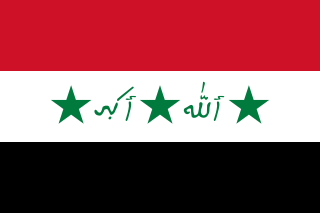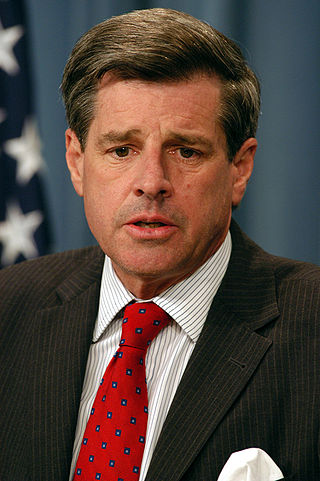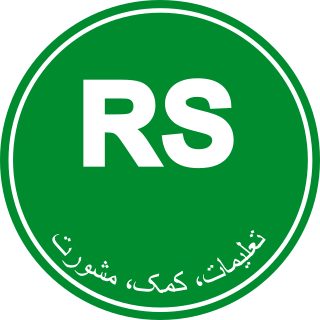
The Coalition Provisional Authority was a transitional government of Iraq established following the invasion of the country on 19 March 2003 by the U.S.-led Multinational Force and the fall of Ba'athist Iraq.

Lewis Paul Bremer III is a retired lobbyist for American weapons manufacturers. He was the second de facto head of state of Iraq as leader of the Coalition Provisional Authority (CPA) following the 2003 invasion of Iraq by the United States, from May 2003 until June 2004.

DynCorp, formally DynCorp International, was an American private military contractor. Started as an aviation company, the company also provided flight operations support, training and mentoring, international development, intelligence training and support, contingency operations, security, and operations and maintenance of land vehicles. DynCorp received more than 96% of its more than $3 billion in annual revenue from the U.S. federal government. The corporate headquarters were in an unincorporated part of Fairfax County near Falls Church, Virginia, while the company's contracts were managed from its office at Alliance Airport in Fort Worth, Texas. DynCorp provided services for the U.S. military in several theaters, including Bolivia, Bosnia, Somalia, Angola, Haiti, Colombia, Kosovo and Kuwait. It also provided much of the security for Afghan president Hamid Karzai's presidential guard and trained much of the police forces of Iraq and Afghanistan. DynCorp was also hired to assist recovery in Louisiana and neighboring areas after Hurricane Katrina. The company held one contract on every round of competition since receiving the first Contract Field Teams contract in 1951.
Investment in post-2003 Iraq refers to international efforts to rebuild the infrastructure of Iraq since the Iraq War in 2003. Along with the economic reform of Iraq, international projects have been implemented to repair and upgrade Iraqi water and sewage treatment plants, electricity production, hospitals, schools, housing, and transportation systems. Much of the work has been funded by the Iraq Relief and Reconstruction Fund, and the Coalition Provisional Authority.
In the United States, Office of Inspector General (OIG) is a generic term for the oversight division of a federal or state agency aimed at preventing inefficient or unlawful operations within their parent agency. Such offices are attached to many federal executive departments, independent federal agencies, as well as state and local governments. Each office includes an inspector general and employees charged with identifying, auditing, and investigating fraud, waste, abuse, embezzlement and mismanagement of any kind within the executive department.
In May 2003, following the invasion of Iraq in March of that year, the Central Bank of Iraq-Development Fund for Iraq (DFI) account was created at the U.S. Federal Reserve Bank of New York at the request of the Coalition Provisional Authority (CPA) Administrator. A part of the fund has been transferred to Baghdad and Iraq, and the DFI-Baghdad account was opened at the Central Bank of Iraq "for cash payment requirements". The fund also eventually received money from seized and "vested" Iraqi bank accounts and funds seized by coalition forces. $650 million of this amount belongs to Uday Saddam Hussein, the older son of the former Iraqi president. The DFI have been disbursed mainly for "the wheat purchase program, the currency exchange program, the electricity and oil infrastructure programs, equipment for Iraqis security forces, and for Iraqi civil service salaries and ministry budget operations".

Stuart W. Bowen Jr., is an American lawyer who served as the Special Inspector General for Iraq Reconstruction (SIGIR) from October 2004 to October 2013. He previously served as the Inspector General for the Coalition Provisional Authority (CPA-IG), a position to which he was appointed in January 2004. Mr. Bowen's mission includes ensuring effective oversight of the $63 billion appropriated for Iraq's relief and reconstruction.

The Office of Inspector General for the Department of State (OIG) is an independent office within the U.S. Department of State with a primary responsibility to prevent and detect waste, fraud, abuse, and mismanagement. OIG inspects more than 270 embassies, diplomatic posts, and international broadcasting installations throughout the world to determine whether policy goals are being achieved and whether the interests of the United States are being represented and advanced effectively.
New Kabul Bank is a bank in Afghanistan that has its main branch in the capital city of Kabul. It was established in 2004 as the Kabul Bank, the first private bank in Afghanistan. After corruption and scandals it was re-established in 2011 as the New Kabul Bank.
United States Intelligence Community Oversight duties are shared by both the executive and legislative branches of the government. Oversight, in this case, is the supervision of intelligence agencies, and making them accountable for their actions. Generally oversight bodies look at the following general issues: following policymaker needs, the quality of analysis, operations, and legality of actions.
The Emergency Economic Stabilization Act created the Troubled Asset Relief Program to administer up to $700 billion. Several oversight mechanisms are established by the bill, including the Congressional Oversight Panel, the Special Inspector General for TARP (SIGTARP), the Financial Stability Oversight Board, and additional requirements for the Government Accountability Office (GAO) and the Congressional Budget Office (CBO).

The Department of Defense Office of Inspector General is an independent, objective agency that provides oversight related to the programs and operations of the United States Department of Defense (DoD). DoD IG was created in 1982 as an amendment to the Inspector General Act of 1978.

The Department of Defense Whistleblower Program in the United States is a whistleblower protection program within the U.S. Department of Defense (DoD) whereby DoD personnel are trained on whistleblower rights. The Inspector General's commitment fulfills, in part, the federal mandate to protect whistleblowers. It also administers the Defense Intelligence Community Whistleblower Protection Program (DICWP), as a sub-mission for the intelligence community. The Inspector General's Defense Criminal Investigative Service also conducts criminal investigations which rely, in part, on Qui Tam relators.

The Office of Inspector General (OIG) for the United States Department of Health and Human Services (HHS) is responsible for oversight of the United States Department of Health and Human Service's approximately $2.4 trillion portfolio of programs. Approximately 1,650 auditors, investigators, and evaluators, supplemented by staff with expertise in law, technology, cybersecurity, data analytics, statistics, medicine, economics, health policy, and management and administration. Based on Federal Employee Viewpoint Survey scores, OIG has been ranked the best place to work in HHS for 5 consecutive years by the Partnership for Public Service.

De-Ba'athification refers to a policy undertaken in Iraq by the Coalition Provisional Authority (CPA) and subsequent Iraqi governments to remove the Ba'ath Party's influence in the new Iraqi political system after the U.S.-led invasion in 2003. It was considered by the CPA to be Iraq's equivalent to Germany's denazification after World War II. It was first outlined in CPA Order 1 which entered into force on 16 May 2003. The order declared that all public sector employees affiliated with the Ba'ath Party were to be removed from their positions and to be banned from any future employment in the public sector.

The Special Inspector General for Afghanistan Reconstruction (SIGAR) is the U.S. government's leading oversight authority on Afghanistan reconstruction. Congress created the Office of the Special Inspector General for Afghanistan Reconstruction to provide independent and objective oversight of the Afghanistan Reconstruction funds. Under the authority of Section 1229 of the National Defense Authorization Act for Fiscal Year 2008, SIGAR conducts audit, inspections, and investigations to promote efficiency and effectiveness of reconstruction programs, and to detect and prevent waste, fraud, and abuse of taxpayer dollars. SIGAR also has a hotline that allows individuals to report suspected fraud.
The Task Force for Business and Stability Operations (TFBSO) is a division of the U.S. Department of Defense established in 2006 to stabilize the post-invasion Iraqi economy, reduce unemployment, and attract foreign investors to Iraq. In 2009, TFBSO expanded operations to include Afghanistan. TFBSO founder and former Deputy Undersecretary of Defense Paul Brinkley described TFBSO stating: “We do capitalism. We’re about helping companies make money.”

Resolute Support Mission (RSM) or Operation Resolute Support was a NATO-led multinational mission in Afghanistan. It began on 1 January 2015 as the successor to the International Security Assistance Force (ISAF), which was completed on 28 December 2014. Pursuant to United Nations Security Council Resolution 2189 of 2014, RSM was a noncombat mission aimed at advising and training Afghan security forces to provide long-term security to the country, under the aegis of the Security and Defence Cooperation Agreement BSA between the United States and Afghanistan, which was originally supposed to run from 1 January 2015 and "shall remain in force until the end of 2024 and beyond" unless terminated with two years' advance notice.

The International Development Law Organization (IDLO) is an intergovernmental organization dedicated to the promotion of the rule of law.

Operation Freedom's Sentinel (OFS) was the official name used by the U.S. government for the mission succeeding Operation Enduring Freedom (OEF) in continuation of the War in Afghanistan as part of the larger Global War on Terrorism. Operation Freedom's Sentinel is part of the NATO-led Resolute Support Mission, which began on January 1, 2015. OFS had two components: counterterrorism and working with allies as part of Resolute Support.













